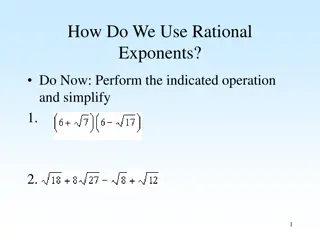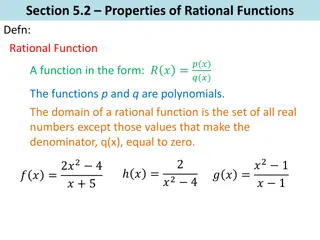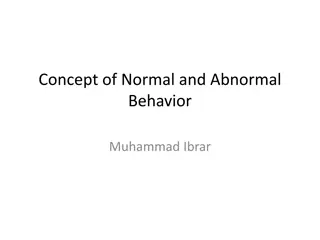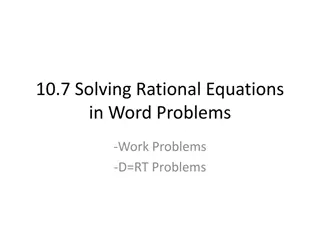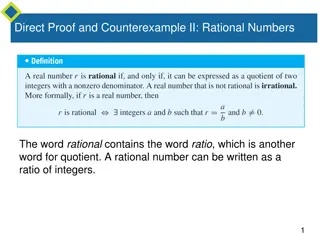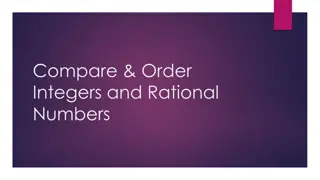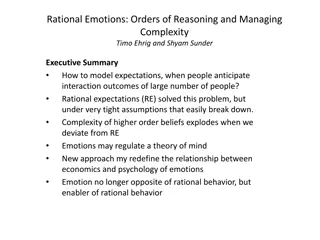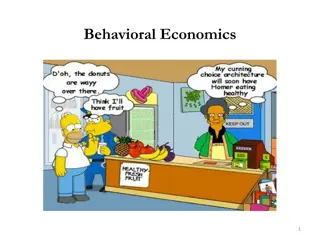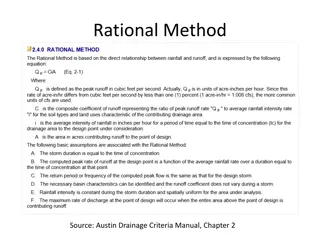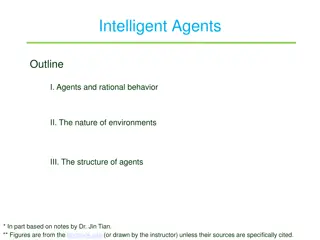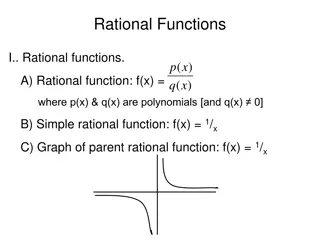RATIONAL NUMBER ARITHMETIC. Day 1: Interpreting Negative Numbers
Explore the concept of negative numbers through practical scenarios such as temperature readings and elevation differences. Learn how to compare rational numbers and describe measurements in relation to sea level, all while engaging in group activities and exercises. Enhance your understanding of ne
1 views • 8 slides
Rational Exponents and Nth Roots
Learn about rational exponents, nth roots, even and odd exponents, evaluating expressions, rules for rational exponents, simplifying radicals, and more in this informative content with visual examples.
1 views • 32 slides
Rational Exponents in Mathematics
Rational exponents, represented by fractions, follow similar properties as integer exponents. This chapter delves into definitions, radical notation, rewriting expressions with rational exponents, and simplifying complex expressions. Through practical examples and explanations, readers can grasp the
0 views • 18 slides
Rational Numbers in Mathematics: A Comprehensive Overview
Exploring rational numbers in mathematics focusing on their properties, comparison, addition, and how to find rational numbers between given values. The module covers concepts from the Atomic Energy Education Society's Distance Learning Programme for Class 7 in Mumbai.
1 views • 17 slides
Real Numbers and Number Systems
Dive into the world of real numbers with topics ranging from the definition of real numbers to Euclid's Division Algorithm and the Fundamental Theorem of Arithmetic. Discover the properties of rational and irrational numbers, learn to find the highest common factor (HCF) and least common multiple (L
1 views • 37 slides
Rational and Irrational Numbers in Mathematics
Explore the concept of rational and irrational numbers in mathematics through defining, distinguishing, computing, representing, and rationalizing these types of numbers. Learn about natural numbers, whole numbers, integers, rational numbers, and irrational numbers with clear examples. Answer common
1 views • 48 slides
Rationality in Science, Religion, and Everyday Life: Exploring Belief Formation and Rational Decision-Making
Explore the essence of rational belief formation across science, religion, and daily life through the lens of cognitive processes, decision-making, and value systems. Delve into the conditions for rational belief, practical decision-making, and axiological rationality to understand human cognition a
1 views • 142 slides
Rational Use of Blood and Blood Administration
Rational use and administration of blood components are essential in modern healthcare to save lives and improve health. Blood transfusion carries potential risks and should be prescribed only for conditions with significant potential for morbidity or mortality that cannot be managed effectively by
0 views • 53 slides
Types of Social Action According to Max Weber
Max Weber's sociology delves into the consequences of different types of social action, exploring how these actions can conflict and create tensions in society. Weber's typology categorizes social action into rational-purposeful, value-rational, affective, and traditional actions, highlighting the c
3 views • 10 slides
Human Behavior: Foundations and Factors
Human behavior is a multifaceted subject influenced by genetic makeup, culture, and individual values. It encompasses both overt actions and covert thoughts, a product of the individual and environmental factors. Psychologists study behavior from visible (overt) actions like playing football to inne
0 views • 20 slides
Properties of Rational Functions
Rational functions are expressed as the ratio of two polynomials. The domain of a rational function excludes values that make the denominator zero. Various examples illustrate how to determine the domain and identify asymptotes in rational functions. Vertical asymptotes exist where the denominator i
4 views • 20 slides
Rational Numbers: A Comprehensive Overview
Discover the world of numbers with this comprehensive guide on different types of numbers, focusing on rational numbers. Learn about natural numbers, whole numbers, integers, and how rational numbers are represented on a number line. Dive into the properties of rational numbers and explore the conce
2 views • 19 slides
Normal and Abnormal Behavior: Perspectives and Definitions
Normal behavior varies from person to person and society, influenced by individual preferences and societal norms. Abnormal behavior is characterized by an inability to function effectively or personal discomfort. The concept of normality and abnormality in psychology raises complex questions about
3 views • 8 slides
Solving Work Problems with Rational Equations
Learn how to solve work problems involving rational equations. Find the least common denominator, multiply by it, and solve for the variables. Practice examples like determining how long it takes workers to finish a task when working together. Also, solve distance equals rate times time problems to
0 views • 7 slides
Collective Action and Voting Behavior: Insights from Herbert Gintis
Explore the dynamics of collective action and voting behavior through the lens of Herbert Gintis' research. Collective action, driven by altruistic motives, plays a crucial role in advancing human rights and democracy. Despite challenges in modeling voter turnout, Gintis suggests a shift towards und
0 views • 37 slides
Human Behavior: Insights for Social Workers
This material delves into the intricacies of human behavior, exploring factors influencing behavior such as heredity, environment, intelligence, needs, and motives. It covers the concept of human behavior, stages in life from conception to old age, and theories of human development by eminent psycho
2 views • 71 slides
The Evolution of Naturalist Thinking in Classical Western Thought
The Naturalist Movement marked a shift in Greek philosophy towards rational study of the natural and moral order, departing from mythological explanations. Philosophers like Aristotle emphasized rational investigation over mythological beliefs, identifying nature with matter. They sought to discern
0 views • 10 slides
Rational Numbers and Their Properties
Rational numbers are ratios of integers and can be expressed in various forms such as fractions and decimals. This content explains how to determine if a number is rational, provides examples, and proves properties of rational numbers like the closure under addition.
0 views • 17 slides
Operations with Rational Numbers
Explore the fundamental operations - addition, subtraction, multiplication, and division - on rational numbers using standard algorithms. Key vocabulary includes rational numbers, adding, subtracting, multiplying, and dividing. Learn the rules for adding and subtracting rational numbers, including d
0 views • 34 slides
Behavior Management in Classroom Settings
Explore the essential topics of behavior management, classroom strategies, and discipline in educational settings. Delve into the functions of behavior, impact of trauma on learning, and effective management techniques. Learn how to identify underlying reasons for student behaviors, discuss behavior
0 views • 76 slides
Integers and Rational Numbers Through Examples
Explore a series of questions that involve comparing and ordering integers and rational numbers, along with practical scenarios like determining temperatures and organizing prices. Test your knowledge on identifying rational numbers, understanding integer properties, and arranging numbers in sequenc
0 views • 16 slides
Reimagining Rationality: Emotions and Economic Behavior
Modeling expectations in economic decision-making involves challenges beyond rational expectations theory. This executive summary explores the interplay between emotions and reasoning, proposing a new approach that considers emotions as enablers of rational behavior rather than opposing it. By intro
0 views • 5 slides
Targeting Emotions to Facilitate Behavior Change in Older Adults
Efforts in changing health behavior have traditionally focused on social and cognitive factors, but recent evidence highlights the importance of affective states in decision-making and behavior change. Janey Peterson discusses the role of emotions in achieving and sustaining behavior change to benef
0 views • 11 slides
Rational Expectations and Efficient Markets
Exploring the concept of rational expectations and its implications on the efficient market hypothesis. Learn how expectations influence various sectors and markets in the economy, including asset demand, risk assessment, information asymmetry, financial innovation, and more. The theory of rational
0 views • 51 slides
Grading Criteria for Effort and Behavior in Educational Reporting
Effort and behavior in educational settings are evaluated based on criteria ranging from Excellent to Causing Concern. Pupils demonstrating excellent behavior show respect, responsibility, and positive engagement in learning. Those with good behavior exhibit cooperation and respect for others, albei
0 views • 9 slides
Collective Behavior in Social Work
Collective behavior encompasses spontaneous and unstructured group reactions to common influences in ambiguous situations. It includes phenomena like mobs, crowds, panics, social movements, and revolutions. Such behavior is characterized by its episodic, emotional, and unpredictable nature, often la
0 views • 14 slides
Behavioral Economics and Decision Making
Behavioral economics challenges the traditional rational agent model by incorporating insights from psychology into economic behavior analysis. This approach reveals systematic biases and departures from rational decision-making, leading to a better understanding of why people make certain choices.
0 views • 16 slides
PBIS Expectations and Behavior Flowchart
The PBIS flowchart outlines behavior expectations and interventions for minor and major incidents in a school setting. It covers disrespectful behavior, disruption, defiance, property damage, theft, possession of weapons, and more. The flowchart guides teachers and staff on managing and addressing s
0 views • 6 slides
Storm Sewer Design Principles and Rational Method for Composite Areas
Explore storm sewer design principles, including inlet time and flow time considerations. Learn about the rational method for composite areas with practical examples to enhance understanding.
0 views • 5 slides
Austin Drainage Criteria Manual - Chapter 2 Resources
This collection of resources includes information on the Rational Method, Mannings N values, and Intensity-Duration-Frequency Curves from the Austin Drainage Criteria Manual Chapter 2. The Rational Method source and key data such as precipitation intensity and duration are highlighted with detailed
0 views • 4 slides
Intelligent Agents: Key Concepts and Rational Behavior
Intelligent agents operate based on perceptions, reasoning, and actions within various environments. Agents function through a sequence of percepts, utilizing programs to interpret their architecture. The Vacuum-Cleaner World serves as an illustrative environment for agent behavior, highlighting the
0 views • 31 slides
Rational Functions and Graphs
Learn about rational functions, including how to define, simplify, and graph them. Explore the parts of graphs such as x-intercepts, y-intercepts, vertical asymptotes, horizontal asymptotes, angled asymptotes, and holes. Discover steps to find all information about rational functions, including hori
0 views • 6 slides
Function-Based Behavior Support Plans: A Comprehensive Guide
Explore the process of developing Function-Based Behavior Support Plans (BSP) using Functional Behavioral Assessment (FBA). Understand the concepts of function and functional behavior assessment, learn how FBA/BSP fits within a multi-tiered support system, and practice developing BSP for students. D
0 views • 74 slides
Rawls' Theory of Justice: Balancing Liberty and Equality
John Rawls, a prominent American philosopher, introduced his theory of justice in his influential book "A Theory of Justice." He emphasized the importance of distributive justice and rational choices in shaping fair social arrangements. Rawls believed in a principle where rational agents would selec
0 views • 16 slides
Rewriting Radicals to Rational Exponents: Examples and Solutions
Learn how to rewrite radicals to have rational exponents through clear explanations and worked examples. Discover the relationship between powers and roots, and improve your understanding of radicals with rational exponents.
0 views • 7 slides
Vertical and Horizontal Asymptotes in Rational Functions
Vertical and horizontal asymptotes play a crucial role in understanding the behavior of rational functions. Vertical asymptotes occur when the denominator of a rational function equals zero, leading to excluded values. On the other hand, horizontal asymptotes are determined by comparing the degrees
0 views • 13 slides
Factors Influencing Voting Behavior: A Comprehensive Analysis
This essay evaluates various factors influencing voting behavior, including media, social class, age, gender, geography, ethnicity, party leader image, issues, rational choice, party affiliation, tactical voting, dealignment, third-party choices, and non-voting. It discusses the relative importance
0 views • 12 slides
Rational Choice Theory in Political Science: Methodological Insights
Rational choice theory, a prominent approach in political science since the 1970s, focuses on strategic interactions among individuals seeking to maximize their own goals. Rooted in economic tools, this theory emphasizes rational decision-making based on individual interests and preferences. Methodo
0 views • 9 slides
Rational Use of Blood and Blood Components in Healthcare
Rational use of blood and blood components is crucial in healthcare settings to maximize resources, minimize risks, and enhance patient outcomes. This involves avoiding unnecessary transfusions, understanding the risks associated with transfusions, dispelling misconceptions, and choosing the most ap
0 views • 32 slides
The Illumination Problem: Exploring Rational Billiards
Delve into the intriguing realm of the Illumination Problem and Rational Billiards, examining questions of illuminability from every point in a region and the fascinating world of translation surfaces. Discover different room types, from convex to non-convex, along with insights from renowned mathem
0 views • 23 slides

